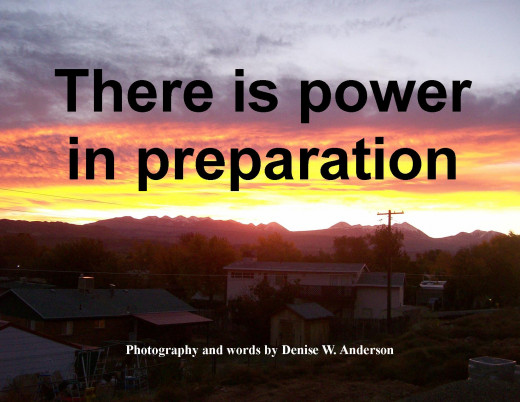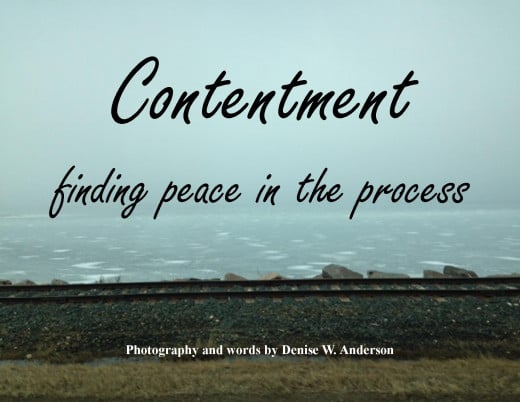Anticipating the Future

For nation shall rise against nation, and kingdom against kingdom: and there shall be earthquakes in divers places, and there shall be famines and troubles: these are the beginnings of sorrows.
— Mark 13:8 (KJV)The world is in commotion
"God must be cruel and inhumane!" the man said, "All around me is death and destruction!"
"I'm always depressed," another told me. "Every time I watch the news, I see things that just make me sick!"
"I'm not going to have any children" the woman said. When I asked her why. she said, "The world is such a terrible place, I don't want them to be a part of it!"
The whole earth is in commotion. We hear of wars in far away nations, terror attacks at schools and airports, people killing their own family members, and sicknesses ravaging the innocent. Surely, there must be some way to shelter and protect our own!
When we anticipate the negative, all we see is difficulty, heartache, pain, and anguish. Like looking through a cracked windshield, we have a distorted view of reality. The road ahead is broken, fragmented to the point that we cannot see ourselves navigating it successfully. Bitterness and misery become our constant companions.
The fact is, anticipation is neither positive or negative, It is what we add to it by the thoughts we entertain that become problematic. See the table below:
Start with
| Add
| End up with
|
|---|---|---|
Doubt
| Worry
| |
Anticipation
| Assumptions
| Misunderstanding
|
Unrealistic Expectations
| Disappointment
| |
Exaggeration
| Vulnerability
|
Anticipation is not the problem
Anticipation can be both a blessing and a curse. When we anticipate the good, we are filled with hope, and look forward to things getting better. We look to the future as a time when all of our problems will be solved. We think that things will get better when we get that new job, our children are a little bit older, or we are able to pay off our debt.
Anticipation of the negative, however, leads us to feelings that we don't want to repeat, in fact, they can even shut us off to living in the present moment. When our future looks bleak, we do not want to go forward. We end up stagnating in a mire of misery, repeating the problems of the past, ignorant of the possibility that there may be another way.

Anticipation of the negative also blinds us to the good that is around us. We see God as a cruel and inhumane taskmaster who punishes the innocent and binds the brokenhearted. In reality, God is bound by natural law just as we are. He cannot force man to do his will, however, he will help those who turn to him.
The best thing to keep us from falling into distorted thinking patterns with our anticipation is to prepare. Preparation provides us with power to change both our present and our future. Taking the time now to look at our situation realistically and making needed changes is the only thing that will have a positive effect on what tomorrow brings.
Preparation takes action. It gives us a goal and purpose that guide what we do with our time and resources. Knowing that we have the ability to change our lives gives us the incentive to move forward in a positive way. We look to God for assistance in our preparation, and we are enabled to become more than we would otherwise.
Be of good cheer. The future is as bright as your faith.
— Thomas S. Monson*Preparation dispels doubt
Doubt runs rampant when we don't know what will happen. The future is filled with mystery and suspense. The most important part of our preparation is the gathering of information. The more information we have at our disposal, the less we will be filled with doubt.
In our gathering, it is wise for us to learn as much as we can from others who have experienced similar things. We learn from our family members, friends, books, and on-line resources that are written on the subject. Our learning gives us much needed information for a workable plan.
Preparation alleviates assumptions
Assumptions are the result of us not knowing what others are thinking. We act based on our own information only. It is much better for us to ask, that way we do not have to assume that we know. Asking questions is a big part of scientific inquiry. The more questions we ask, the more information we are able to have at our disposal, and the more accurate is that information.
Assumptions have to be checked before we make decisions based upon them. If we find that our assumptions are correct, we can give ourselves a pat on the back.
If our assumptions are not correct, we need to rethink what we are doing. All decisions are based on what we believe to be true at the moment. If, however, we find that we are wrong, we have to rewind the process.
When we prepare for the future, we gather information and study the situation, then make a plan. Our plan is much more valid and reliable when it is based on factual information rather than assumptions.

How do you prepare for the future?
Preparation exposes exaggeration
Preparation allows us to see things as they really are, rather than as we thought they were. Exaggeration happens when we hear something, and then retell our version of what we heard. With each retelling, the details get more and more out of proportion.
Before we pass information along to others, we need to check out the source of that information. Is the source credible? Are the facts documented? Have there been any other sources that say something similar?
Many fears are born of exaggerated information. As a result, these fears are based on emotional responses rather than on facts. It is our job to get as much information as possible before we act on that information.
Preparation enables realistic expectations
Unrealistic expectations often get us into trouble. We think we know what others want us to do, or what we want of ourselves, but we haven't taken the time to check it out. Our preparation and planning give us time to do that very thing.
When we undertake any type of project, our planning includes counting the cost, estimating the size, shape, time, and materials needed, and then putting a price tag on the total. If we haven't taken the time to look carefully at all these aspects, we are setting ourselves up for problems with the outcome.
... if ye are prepared ye shall not fear.
— D&C 38:30**Our experience teaches us what is realistic and what is not. Our preparation is often based on our past experience. If we are a novice, we would do well to talk to others who have been there and get their advice on what can be realistically accomplished. Then, our estimates will be more accurate, and we will find that we can live up to them adequately.
Preparation helps avoid many of the problems associated with anticipating the future. It dispels doubt, alleviates assumptions, exposes exaggeration, and enables realistic expectations. Taking time today to prepare for the future gives today more meaning and purpose, and increases our level of happiness and peace.
*Words by Thomas S. Monson from the April 2009 General Conference of The Church of Jesus Christ of Latter-day Saints (link).
**D & C, The Doctrine and Covenants, published by The Church of Jesus Christ of Latter-day Saints.
This content is accurate and true to the best of the author’s knowledge and is not meant to substitute for formal and individualized advice from a qualified professional.
© 2015 Denise W Anderson








